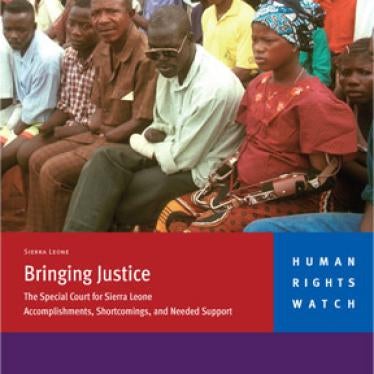Dear Foreign Minister,
We are writing to urge your government to support justice for serious crimes committed during the Sierra Leone civil conflict.
The Special Court for Sierra Leone, established by agreement between the United Nations and the Sierra Leone government in 2002, provides a crucial opportunity to bring a measure of justice to the countless victims of crimes committed during the civil war and build respect for the rule of law in Sierra Leone. The court was established at a time when the International Criminal Court (ICC) did not exist, and has a mandate to prosecute serious crimes that are beyond the temporal jurisdiction of the ICC as they were committed prior to 2002 when the Rome Statute entered into force. Sierra Leone was one of the first countries to ratify the Rome Statute.
The Special Court for Sierra Leone is currently facing a serious financial shortfall. We urge governments to support accountability for serious crimes in Sierra Leone by making a voluntary contribution at the upcoming pledging conference for the court hosted by the U.N. Secretary-General on September 30, 2005.
The Special Court for Sierra Leone, established by agreement between the United Nations and the Sierra Leone government in 2002, provides a crucial opportunity to bring a measure of justice to the countless victims of crimes committed during the civil war and build respect for the rule of law in Sierra Leone. The court was established at a time when the International Criminal Court (ICC) did not exist, and has a mandate to prosecute serious crimes that are beyond the temporal jurisdiction of the ICC as they were committed prior to 2002 when the Rome Statute entered into force. Sierra Leone was one of the first countries to ratify the Rome Statute.
The Special Court is currently facing a serious financial shortfall. We urge your government to support accountability for serious crimes in Sierra Leone by making a voluntary contribution at the upcoming pledging conference for the court hosted by the U.N. Secretary-General on September 30, 2005.
The Special Court is Helping to Bring Justice for Serious Crimes
The crimes committed during Sierra Leone's eleven year civil war were characterized by extreme brutality, including widespread amputation, rape, abduction, murder and mass displacement of people. The Special Court provides an important chance for Sierra Leone to overcome its past abuses.
The court has indicted persons accused of bearing the greatest responsibility for serious crimes from all major warring factions in the conflict. It has issued precedent-setting decisions on international law and is currently trying nine accused simultaneously before two trial chambers. The court's defense office helps to ensure adherence to fair trial standards, and its outreach program helps to make the court accessible to those most affected by the crimes. Over a hundred witnesses from around the country, receiving protection and support, have testified. Talking with Sierra Leoneans in Freetown during a field mission in April 2005, Human Rights Watch researchers found that there is a significant degree of awareness about the court among the local population, and that the court is elevating expectations that justice can and should be done.
At the same time, Human Rights Watch has expressed concerns regarding various aspects of court operations. These include an overly restrictive interpretation of the court's mandate by the Office of the Prosecutor and instances of disrespectful treatment of witnesses in the courtroom. Human Rights Watch will continue to evaluate the Special Court's work and make recommendations to ensure that the court operates as fairly and effectively as possible.
Additional Voluntary Contributions are Needed to Support Justice for Serious Crimes Committed in Sierra Leone
Initially dependent on voluntary financial contributions, the Special Court has struggled to operate effectively within an insufficient and insecure funding environment. Despite crucial voluntary contributions by governments and a subvention grant provided by the United Nations General Assembly, the Special Court does not have adequate funds to complete its work. It is currently seeking $25 million to cover the last major phase of operations.
Not surprisingly, the court's expenses have surpassed its three year projected budget. A fair and credible process prosecuting serious crimes tends to be by its nature a complex, slow, and expensive endeavor. Such prosecutions often involve offenses committed over long periods of time, in far reaching geographic areas, with numerous perpetrators and victims.
On May 24, 2005, the U.N. Security Council held an unprecedented session on the Special Court in which council members "emphasized the essential need for further pledges of voluntary contributions in order to allow the court to complete its mandate in a timely manner and urged all UN Member States to consider making such pledges." (SC/8392 (2005))
We urge your government to attend the upcoming September 30, 2005 pledging conference for the Special Court hosted by the U.N. Secretary-General with high-level representation, to make a voluntary contribution to the court, and to announce the contribution at this conference. Inadequate funding for the Special Court at this stage would be detrimental to the court's ability to fulfill its mandate to bring justice for those who bear the greatest responsibility for serious crimes in Sierra Leone.
We hope that your government can make a vital contribution to help ensure that justice can be done.
Sincerely,
Richard Dicker
Director
International Justice Program
Human Rights Watch







